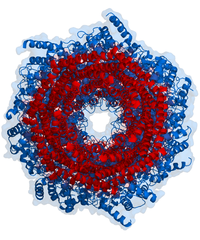
Photo from wikipedia
Eukaryotic cells react to various stress conditions with the rapid formation of membrane-less organelles called stress granules (SGs). SGs form by multivalent interactions between RNAs and RNA-binding proteins and are… Click to show full abstract
Eukaryotic cells react to various stress conditions with the rapid formation of membrane-less organelles called stress granules (SGs). SGs form by multivalent interactions between RNAs and RNA-binding proteins and are believed to protect stalled translation initiation complexes from stress-induced degradation. SGs contain hundreds of different mRNAs and proteins, and their assembly and disassembly are tightly controlled by post-translational modifications. The ubiquitin system, which mediates the covalent modification of target proteins with the small protein ubiquitin (‘ubiquitylation’), has been implicated in different aspects of SG metabolism, but specific functions in SG turnover have only recently emerged. Here, we summarize the evidence for the presence of ubiquitylated proteins at SGs, review the functions of different components of the ubiquitin system in SG formation and clearance, and discuss the link between perturbed SG clearance and the pathogenesis of neurodegenerative disorders. We conclude that the ubiquitin system plays an important, medically relevant role in SG biology.
Journal Title: International Journal of Molecular Sciences
Year Published: 2022
Link to full text (if available)
Share on Social Media: Sign Up to like & get
recommendations!